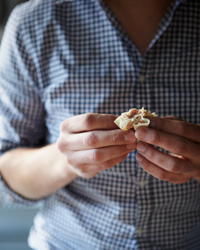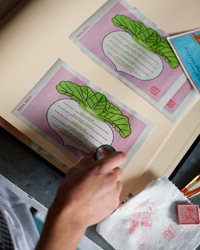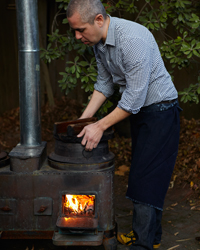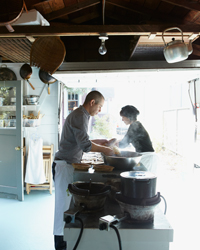Any good caterer knows that garnishes should be fresh. But it would be a reckless understatement to call Sylvan Mishima Brackett “good.” For a casual dinner with friends, the owner of Oakland, California-based Japanese catering company Peko Peko makes a 40-minute detour to a friend’s backyard in Berkeley. In the fading light, he clambers over hillocks of wild watercress, his bee-striped sneakers growing damp as he crouches down to hunt for the tenderest shoots. He snaps off 10 or 12 of them, stem by stem.
Back in the test kitchen at his house, Brackett prepares the soup course. In the drafty converted garage where he tests new dishes, he plans to make silken tofu bathed in dashi stock and garnished with crabmeat. Serious Japanese cooks shave their own dried tuna for dashi, so he hammers the blade of his Japanese carpenter’s plane into place and unpacks the katsuobushi (dried, fermented and smoked skipjack tuna) that he bought in Japan. (Born in Kyoto and raised in California, Brackett returns to Japan at least once a year to eat and to stock his pantry.)
 Sylvan Mishima Bracket of Peko Peko Catering forms crab and pork dumplings. Photo © Fredrika Stjärne.
Sylvan Mishima Bracket of Peko Peko Catering forms crab and pork dumplings. Photo © Fredrika Stjärne.Kirk Lombard, a fisherman friend, knocks on the door bearing Dungeness crab fresh from the Bay. In the warm glow of the two bulbs hanging from the raftered ceiling, Brackett hands his visitor a glass of tart-sweet plum wine, brewed from fruit harvested from another friend’s backyard. He pulls the crabs out of the bucket, their claws snapping furiously. His test kitchen has no stove, but the next afternoon, Brackett will fire up one of his three 50,000-plus BTU portable wok burners to steam the seafood.
Despite all the attention to detail, Brackett himself is wonderfully mellow. With Peko Peko, he aims to capture the low-key atmosphere of Japan’s most informal dining venues, the drinking pubs called izakayas. “Izakayas really took off in the 1950s and ’60s, when the new class of salarymen would go out to eat,” he explains. “The best ones were located under the train tracks, little stalls selling simple things.” He loved the scene, he says. “I wanted to re-create some of that feeling in California.”
 Peko Peko Catering menus. Photo © Fredrika Stjärne.
Peko Peko Catering menus. Photo © Fredrika Stjärne.To foster a “throwback-y” atmosphere, he Photoshops images from Japanese matchbooks from the 1920s and ’40s to use for his menus. (He taught himself graphic design as Alice Waters’s longtime personal assistant, and later the creative director of Chez Panisse.) Unusual for a catering operation, he has also commissioned his own hand-thrown Japanese plates, many from one of his cooks, Yuko Sato, who studied ceramics in Tokyo and has an online shop, Nama Ya (nama-ya.com). Just in the last year, his client list has grown to include tech companies, which order his beautiful bento-box meals by the hundreds, and the more experimental-minded Scribe Winery, which, for a recent party, invited him to run a secret udon restaurant inside a closet. He has also begun looking at spaces to open a restaurant.
 Peko Peko Catering’s Sylvan Mishima Brackett steams rice over a wood fire. Photo © Fredrika Stjärne.
Peko Peko Catering’s Sylvan Mishima Brackett steams rice over a wood fire. Photo © Fredrika Stjärne.Brackett’s wife, Jenny Wapner, a cookbook editor, has spoken to him about moderation. But she doesn’t mind that his test kitchen has taken over their yard: Brackett prefers foods cooked over wood fires. At the dinner party the next night, as their friends arrive, he grills exquisite chicken-and-yuzu meatballs on the yakitori grill he’s improvised on the mantle of their outdoor fireplace. When a log explodes, issuing a loud pop, Wapner doesn’t blink but sends Brackett to check the wood-fired Japanese rice cooker. It’s blazing at full strength to steam rice stirred with tangy pickled cherry blossoms—flowers harvested from yet another friend’s backyard.
“There’s this tension,” Brackett admits as he stirs the fire to settle the coals. “Once people call you a chef, you feel compelled to justify it. My food is getting fancier.” He pulls down one of Sato’s matte, iron-hued platters, on which he’ll serve a cloud-like omelet laced with mirin and soy sauce. As he fusses with another garnish of pickled ginger, he laughs. “I need to go back to meat on sticks.”
Emily Kaiser Thelin is a writer and former F&W editor living in Berkeley, California.

Peko Peko Catering’s Sylvan Mishima Brackett creates new dishes in the converted garage he calls his test kitchen. Photo © Fredrika Stjärne.
No comments:
Post a Comment